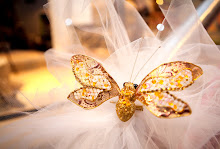It's a ridiculous idea that wedding shoes necessitate a higher expense than what you would on average pay for regular shoes. I mean, they touch the ground. Unless they come with hovering capabilities, in which case they might actually be worth the extra cash. Hardly anyone will be looking at your feet, even if your dress isn't floor length. It's not as hard as you think to find a lot of really nice looking shoes (that are color appropriate) for a very decent price.
For really reasonable yet fashionable options, shop DSW. They don't have a "wedding" section but you can filter the online search by style and color. There are also styles frequently offered in the store that don't appear online. One of the pairs of shoes I considered purchasing for my wedding was an ivory high heel by Mootsies Tootsies (for about $30) which I found in my local DSW (Ardmore, PA) but did not appear in the online inventory.
Department stores like Macy's are also good for browsing - shoes are constantly going "out of style" and therefore going on sale. I didn't have a lot of luck browsing, but I'm also not the most patient "in store" shopper. I prefer to browse the internet.
Where I finally ended up purchasing my wedding shoes was Zappos.com. The obvious con with shopping online is that you cannot try the shoe on prior to purchase, and shoe sizes vary from brand to brand. However, Zappos, unlike many other sites, will cover the cost of shipping the shoes back for a return, should they not be what you are expecting (in terms of size, style, etc). Zappos actually has a bridal shoe category - you can narrow search results by other specifics within this subset of shoes by size and by price. There's also a bridesmaid category, in which cheaper shoes appear (and it doesn't seem that there is anything in particular that makes a shoe for a bridesmaid vs. a bride). If you are looking for ivory shoes, you can't actually filter search results by this color, but many of the white "bridal" shoes are also offered in ivory (and sometimes other colors as well).
This advice goes for men's shoes as well, perhaps even more so. I am probably evoking scoffs from the global fashion community as I write this, but men's shoes by and large... kind of all look the same. My fiance bought a nice pair of some no-name company's dress shoes from our local West Philly overstock shoe store. They look great, cost like 40 bucks, and no one will know the difference (or care that there might be one).
If you can, find a shoe that you might actually wear again. Like I said, no one's really going to be looking at your feet. Certainly your future spouse won't be, and I'm pretty sure I've never seen close up photos of the bridal shoes in people's wedding albums. The biggest savings can come from reducing expenditures on these smaller details that will not ultimately be that consequential come your wedding day.
